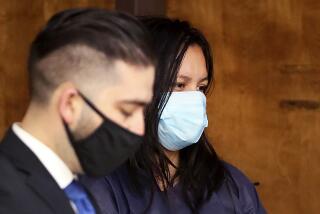Caro Shot Sons to Protect Them, Psychiatrist Says
- Share via
When Socorro Caro killed her three young sons before shooting herself, she only meant to protect them, according to a psychiatrist who testified Monday in the penalty phase of her murder trial.
The slayings were part of her attempt at an “extended suicide,” said Daryl Matthews, director of the forensic psychiatry program at the University of Hawaii. Matthews, who has studied a number of women convicted of killing their children, said Caro is among those driven by “altruistic” motives.
The mind-set of such women is: “‘If I’m going to kill myself, my children are better off without me,” he said. “They want to prevent something bad from happening to their children rather than doing something unkind to them, as bizarre as that seems.”
The distinction could be crucial for Caro as her attorneys try to persuade jurors to spare her life. Convicted last month in Ventura County Superior Court of first-degree murder, the 44-year-old Santa Rosa Valley woman will be sentenced either to life in prison without parole or death by injection. Jurors are expected to start deliberations Thursday.
Matthews said Caro was depressed when she fatally shot her sons the night of Nov. 22, 1999. He added, however, he was not familiar enough with the case to specify which of many possible depressive disorders she had. He also could not be certain about what effect the mixture of alcohol, the anti-depressant Prozac and the anti-anxiety medication Xanax in Caro’s system may have had.
Expert Dismisses Revenge as Motive
During a nine-week trial prosecutors argued that Caro killed three of her four boys to punish her straying husband, but Matthews said Monday that was unlikely.
Suicide attempts are infrequent in such crimes, and women bent on revenge have personality disorders more serious than those he saw in Caro, Matthews testified.
“They have a long history of being poorly adjusted in many life areas,” he said. “They are not very well-bonded to their children.”
The psychiatrist took the stand after a series of witnesses testified to Caro’s qualities as a loving mother. Teachers from her sons’ elementary school, a woman who gave religion lessons at the Caro family’s Camarillo church, a former employer, friends and relatives painted Caro as unswervingly compassionate.
In response, Deputy Dist. Atty. Cheryl Temple persistently raised a question designed to temper the effect on jurors of such glowing accounts: With Caro convicted of first-degree murder, she asked witnesses, do you still see her as a loving mother?
Matthews initially was consulted by prosecutors in the case but never offered his testimony to jurors. Defense attorneys contacted him in November, and he interviewed Caro on Saturday.
Caro Did Not Confess to Slayings
He found her eager to cast herself positively, he said.
“It’s hard to imagine a more stressful circumstance than what the woman is undergoing,” he said. “For her to want to present herself to me in the best light is wholly understandable.”
During their session, he said, she did not confess the crimes.
Matthews said Caro has displayed some features of a condition called “borderline personality disorder,” such as a volatile temper and a tendency to act impulsively. He added, however, those traits aren’t pronounced enough for a firm diagnosis.
More to Read
Sign up for Essential California
The most important California stories and recommendations in your inbox every morning.
You may occasionally receive promotional content from the Los Angeles Times.













